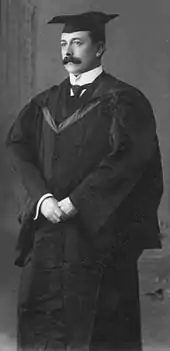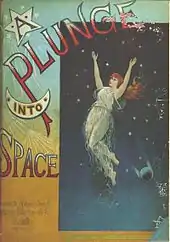Robert Cromie
Robert Cromie (1855–1907) was a Belfast journalist and novelist. He was the third son of Dr. Cromie J.P., of Clough, the local registrar of births and deaths and ruling elder of Clough Presbyterian church. Robert's elder sister, Annie Howe Cromie,(1849-1939) to whom he was particularly close, was the wife of Sir John Jordan, (the British Ambassador to China between 1906 and 1920) and named her second son after him. Through Cromie's mother, a Miss Henry of Ballyhosset, near Downpatrick, he was descended from Gilbert Howe (c.1626-c.1712), of Ballytrim, near Killyleagh, the confidential servant to James 1st Earl of Clanbrassil, and was thus connected by blood to many of the leading families in East Down.


Cromie was born on 17 July 1855 at Clough. He was educated at home before being sent with an older brother to the Royal Belfast Academical Institution where, according to one article, he claimed "an unbeaten record in the matter of examinations, having never once failed, by reason...of having never once entered".[1]
Instead of pursuing an academic path, he followed one of his brothers, Andrew Gilbert Howe Cromie (died 1937) into the Ulster Bank and worked in various parts of Ireland including Donegal, Trim and Derry. His final posting was to the Ulster Bank's head office in Waring Street, Belfast. While working in Trim, Cromie developed a close friendship with Charles Reichel, Bishop of Meath, an association regarded as influential on the development of Cromie's style.[1]
His first book, For England's Sake, was published in 1889.
A Plunge into Space, a science fiction novel, was published in 1890. This work predates H. G. Wells's The First Men in the Moon by some 10 years, but contains a number of similarities. Cromie pointed these out in letters to the Academy journal.[2][3] Cromie's 1895 novel The Crack of Doom was his most successful and contains the first description of an atomic explosion.[4]
Cromie's other great passion was golf. He was a member of the Ormeau Golf Club and the captain in 1898.
Robert Cromie died unmarried in his rooms at 95 South Parade Belfast in April 1907.[5][6]
Bibliography
- For England's Sake, London & New York: Frederick Warne & Co., 1889
- A Plunge into Space, London & New York: Frederick Warne & Co, 1890
- The Crack of Doom, London: Digby, Long & Co, 1895; London: George Newnes, 1896.
- The Next Crusade, London: Hutchinson & Co, 1896
- The King's Oak, and Other Stories, London: R. Aickin & Co; Belfast: Geo. Newnes, 1897
- The Lost Liner, London: R. Aickin & Co; Belfast: Geo. Newnes, 1898
- Through Southern Norway, Belfast: R. Aickin & Co. Ltd., 1898
- Kitty's Victoria Cross, London & New York: Frederick Warne & Co, 1901
- A New Messiah: A Novel, London: Digby, Long & Co, 1901
- The Shadow of the Cross, London: Ward, Lock & Co, 1902
- The Romance of Poisons: being weird episodes from life, London: Jarrold & Sons, 1903. (co-authored with T. S. Wilson)
- El Dorado, London: Ward, Lock & Co, 1904
- Told in the Twilight, Dublin: Sealy, Bryers & Walker, 1907[?]
References
- "Mr. Robert Cromie", The Whitehall Review, July 13, 1895.
- Cromie, Robert "Rights in Gravitation.", Academy, 1545 (1901:Dec. 14) p.597
- Cromie, Robert "Rights in Gravitation.", Academy, 62:1548 (1902:Jan. 4) p.659
- Hourican, Bridget "Reading between the lines: why sci-fi sometimes gets it right", Technology Ireland, January 2007
- Kennedy, Diarmuid "Belfast Boom", Verbal Magazine, November 2010
- "Mr. Robert Cromie: a successful local author", Belfast Evening Telegraph, April 8, 1907
External links
- Works by Robert Cromie at Project Gutenberg
- Works by or about Robert Cromie at Internet Archive
- Diarmuid Kennedy, "Belfast Boom", Verbal Magazine, November 2010
- Bibliography at Fantastic Fiction – with cover images
- Robert Cromie at Library of Congress Authorities, with 3 catalogue records
